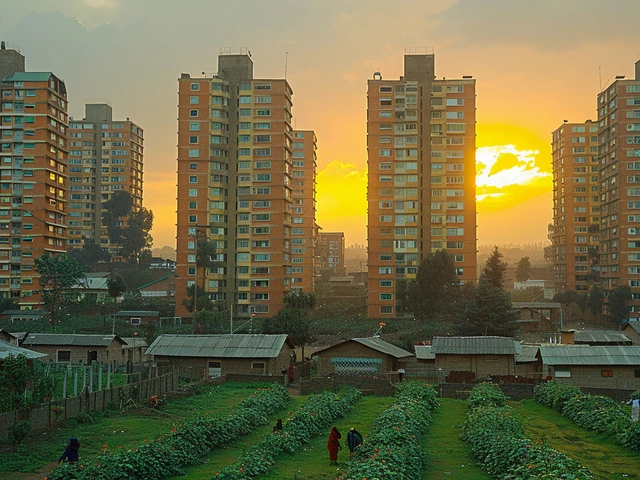Nursing is a vital profession worldwide, and Ethiopia is no exception. But just how much do nurses get paid in this East African country? In 2024, the income of a nurse in Ethiopia varies greatly depending on several factors, including experience, location, and whether they work in the public or private sector.
Newly graduated nurses in Ethiopia often start with a modest salary. Typically, an entry-level nurse in the public sector might earn around ETB 5,000 to ETB 7,000 per month, roughly translating to $90-$130 given current exchange rates. While these figures might appear low compared to global standards, it’s important to consider the local cost of living and the economic context.
Nurse salaries increase with experience. Middle-tier nurses—those with approximately 5-10 years of experience—can expect to make between ETB 10,000 and ETB 15,000 monthly. Senior nurses and those in specialized fields may earn up to ETB 20,000 or more.
The private sector tends to offer higher salaries compared to the public sector. However, benefits like job security and pensions in public hospitals can make them an attractive option despite the lower pay.
Beyond public and private sector differences, geographic location also plays a significant role. Nurses in urban areas like Addis Ababa generally earn more than those in rural regions, reflecting the higher cost of living and greater demand for healthcare services in cities.
Working as a nurse in Ethiopia comes with both rewards and challenges. While the financial gains may not be substantial, the profession offers a sense of fulfillment and job stability. If you're considering this career path, focus on gaining experience, as higher expertise can significantly boost your earning potential and career growth.
- Introduction to Nursing Pay in Ethiopia
- Factors Influencing Nurse Salaries
- Differences Between Public and Private Sector
- Regional Salary Variations
- Benefits and Challenges for Ethiopian Nurses
- Tips for Aspiring Nurses
Introduction to Nursing Pay in Ethiopia
Nursing is an essential part of the healthcare system in Ethiopia, a country known for its rich cultural heritage and diverse landscapes. Salaries for nurses in Ethiopia are influenced by several factors and can vary widely. For new nurses just starting out, understanding what they can expect to earn is crucial for planning their careers.
Newly graduated nurses generally begin their careers in the public sector. In this setting, a novice nurse's monthly salary typically ranges from ETB 5,000 to ETB 7,000, which equates to approximately $90-$130. This may seem modest compared to international standards, but it's more meaningful in the context of Ethiopia's cost of living. Ethiopia's healthcare system is predominantly overseen by the government, which means a significant number of nurses find their first positions in public hospitals and clinics.
The salary for nurses varies significantly depending on their experience levels. For instance, nurses with around 5-10 years of experience can expect a monthly salary between ETB 10,000 and ETB 15,000. Senior nurses, especially those who have specialized skills or occupy managerial roles, may earn upwards of ETB 20,000 per month. These figures show how experience and specialization can greatly enhance a nurse's earning potential.
In 2024, the gap between public and private sector salaries remains prominent. Private hospitals and clinics often offer higher salaries to attract skilled professionals. Despite the usually better pay in the private sector, public sector roles are often favored for their job security, benefits, and pensions, which are significant considerations in long-term career planning.
Rural versus urban location also has a substantial impact on nursing pay. Nurses working in urban areas, particularly in the capital city Addis Ababa, usually earn more than those in rural areas. A nurse in Addis Ababa might receive higher compensation due to the greater demand for healthcare services and the higher cost of living in the city. However, rural areas may offer certain benefits like lower competition and sometimes enhanced government incentives to attract healthcare professionals.
The Ethiopian Ministry of Health and various international organizations have been working hard to address the discrepancies in healthcare pay and distribution. Recent policy changes suggest an effort to standardize salaries and improve working conditions, aiming to retain talent within the country. Ethiopia's commitment to improving its healthcare workforce is seen in initiatives like the Health Extension Program (HEP), which provides additional training and better pay for healthcare workers in rural areas.
"Ethiopia has made great strides in its healthcare sector, and we recognize the importance of fair and competitive compensation for our nurses and healthcare workers," states a representative from the Ethiopian Ministry of Health. This commitment aims to reduce the brain drain where skilled professionals seek better-paying opportunities abroad.
In summary, while nurse salaries in Ethiopia may appear modest by some standards, they reflect a complex interplay of factors. For new nurses or those considering a career in healthcare, understanding the various influences on salary can help them make informed decisions about their professional paths. From experience to location, each aspect plays a crucial role in determining how much a nurse can expect to earn in Ethiopia in 2024.
Factors Influencing Nurse Salaries
Several factors come into play when determining how much nurses earn in Ethiopia. First and foremost is the level of experience. Just like in many professions, nurses see their pay increase as they gain more years of experience. A nurse fresh out of college might start with a monthly salary of about ETB 5,000 to ETB 7,000, while a more experienced nurse with over a decade of service could make upwards of ETB 20,000. Experience not only brings higher wages but also opportunities for promotions and specialized positions.
Another significant factor is the educational background of the nurse. Those holding a Bachelor of Science in Nursing (BSN) typically earn more than those with just a Diploma in Nursing. Specialized certifications and further training can also pave the way for higher salary brackets. It's not uncommon for nurses with advanced qualifications to secure positions that pay substantially more.
Location plays a crucial role in salary differentiation. Nurses working in urban centers like Addis Ababa tend to earn more compared to their counterparts in rural areas. This disparity is due to several reasons, including the higher cost of living in cities and the greater demand for healthcare services in densely populated regions. Rural areas, though, may offer other incentives such as housing allowances and hardship allowances to attract medical professionals to less developed regions.
The sector a nurse works in influences their earnings as well. Nurses in the public sector usually have access to benefits like job security, pensions, and health insurance. However, salaries in the public sector might be lower compared to the private sector, where nurses may see higher paychecks but often lack the extensive benefits. Private hospitals and clinics frequently offer competitive salaries to attract and retain skilled professionals.
One must also consider the specific specialization a nurse holds. Nurses with specialized skills, such as those in critical care, anesthetics, or midwifery, tend to command higher salaries. The reasons are simple: specialized fields require additional training, and the expertise is highly sought after. The growing trend of specialization has made it an appealing option for many nurses looking to increase their income.
Beyond these factors, there are also institutional policies and funding that affect salary scales. Government hospitals, for instance, might have fixed pay structures regulated by the state, while private entities may have more flexibility to adjust salaries based on performance and market demand. Sometimes, international aid and foreign investments in specific hospitals or healthcare projects can lead to temporary boosts in salaries or bonuses for nurses involved in those projects.
The economic health of the nation also hasn't been left out. When Ethiopia's economy grows, so does the allocation of funds to the healthcare sector, often resulting in pay raises and better working conditions for healthcare workers, including nurses. Conversely, economic slowdowns can lead to salary freezes or cuts, impacting the morale and financial stability of those in the nursing profession.
"Nursing salaries in our rural facilities are often supplemented by additional benefits and allowances to compensate for the challenging working conditions," explains Dr. Medhin, a healthcare policy expert in Ethiopia.
Lastly, the influence of unions and professional bodies can't be overlooked. In Ethiopia, organizations representing healthcare workers are active in advocating for better pay and working conditions. Their efforts often result in negotiations with employers that can lead to salary increments or improved benefits packages for nurses. The role of these bodies is critical in ensuring that nurses' voices are heard and their needs addressed in the broader policy framework.

Differences Between Public and Private Sector
When it comes to nursing salaries in Ethiopia, the differences between the public and private sectors are quite notable. On average, nurses in private hospitals tend to earn more compared to their counterparts in public healthcare facilities. For instance, a nurse starting in a private hospital may earn between ETB 8,000 to ETB 12,000 per month, whereas a nurse with the same experience in a public hospital might earn around ETB 5,000 to ETB 7,000. This discrepancy can be quite significant over the course of a year.
Though the initial pay might be higher in the private sector, public hospitals often provide more comprehensive benefits packages. These benefits can include job security, pension plans, and sometimes even housing allowances. Such perks might be appealing to many nurses, especially those who are looking at long-term career stability. Pension plans are especially valued, as they offer financial security upon retirement, something that is less certain in many private sector roles.
One crucial aspect to consider is the workload and working conditions. Many nurses report that public hospitals are typically more crowded, with higher patient-to-nurse ratios. This can translate to longer hours and more stress. In contrast, private hospitals often have better staff-to-patient ratios, which can make for a more manageable workload. This divergence in workload and working conditions is pivotal and should not be underestimated when choosing between the two sectors.
Another point to consider is the type and quality of training and ongoing professional development available. Private hospitals sometimes offer more opportunities for specialized training and professional growth, whereas public hospitals might be limited due to budget constraints. In fact, a survey by the Ethiopian Nurses Association revealed that 60% of nurses in the private sector felt they had better access to training programs compared to 40% in the public sector.
Access to resources can also vary significantly. Private hospitals might have more advanced medical equipment and better supplies due to their higher budgets and funding. This can affect the quality of care nurses can provide and also their overall job satisfaction. Moreover, this difference in resources can influence the types of treatments and procedures that nurses are involved in, offering a more diversified working experience in many private hospitals.
It's also worth mentioning that there can be variation within each sector based on the hospital's location. For example, public hospitals in urban areas like Addis Ababa might offer slightly higher salaries and better conditions compared to those in rural areas. This urban-rural divide is quite pronounced and affects not only salary but also the overall work environment and opportunities for professional growth.
Choosing between the two sectors often boils down to personal priorities and career goals. For those who prioritize higher immediate earnings and possibly better working conditions, the private sector might be the better choice. On the other hand, for nurses looking for long-term benefits like job security and pensions, the public sector offers undeniable advantages. As one seasoned nurse put it,
“While the private sector offers better pay upfront, the public sector gives me peace of mind with its stability and benefits.”This sentiment is echoed by many experienced nurses who have spent years navigating the Ethiopian healthcare system.
Regional Salary Variations
The salary of a nurse in Ethiopia can significantly differ depending on the geographic location. In major cities like Addis Ababa, the salaries tend to be higher owing to the elevated cost of living and greater demand for skilled healthcare professionals. Nurses working here can expect to earn between ETB 8,000 to ETB 20,000 monthly, depending on experience and the type of institution they are employed in.
Outside the bustling capital, in smaller cities such as Gondar and Hawassa, salaries are generally lower but still competitive within the healthcare sector. Here, a nurse might earn between ETB 6,000 to ETB 12,000 per month. The lower cost of living in these regions often means these salaries can provide a relatively comfortable life. However, opportunities for career advancement and specialization might be less than in the more urbanized areas.
Rural areas present a stark contrast in terms of pay. Nurses in remote regions might start with a salary as low as ETB 4,000 to ETB 6,000 per month. The Ethiopian government and non-governmental organizations often provide incentives like housing and hardship allowances to attract healthcare workers to these underserved areas. A nurse named Adanech Tesfaye, who has worked in the rural South Omo Zone for over seven years, shares,
"While the financial compensation might be lower, the rewards of serving in a community that desperately needs care brings a deep sense of fulfillment."
Data from the Ethiopian Ministry of Health suggests that regional disparities in salaries are also influenced by the availability of healthcare services and infrastructure. In regions with well-established hospitals and clinics, salaries might be higher compared to those in areas with fewer medical facilities. For example, nurses working in the Amhara region, where major hospitals are present, tend to earn higher than their counterparts in sparsely populated areas like Somali region.Nursing wages in Ethiopia are also impacted by local economic activities. Regions that have a high concentration of economic activities, such as manufacturing or mining, often see higher healthcare worker wages due to better local revenue.
Among various Ethiopian regions, the Oromia region shows interesting trends. While certain urban centers like Adama provide salaries close to that of Addis Ababa, more rural parts of Oromia observe salaries akin to other rural areas in the country. Despite the variations, the shared commitment among nurses across Ethiopia is palpable; they strive to provide the best care regardless of where they practice. Nurse Alem Kassa, who has worked across the country, notes,
"The sense of community and the gratitude of patients often overshadow the monetary aspects of the job."
In conclusion, for aspiring nurses or those looking to relocate within Ethiopia, understanding these regional salary variations is crucial. Consider the balance between salary, cost of living, and personal satisfaction. Whether serving in bustling cities, mid-sized towns, or remote communities, every region offers unique experiences and challenges, making nursing in Ethiopia a richly diverse career opportunity.

Benefits and Challenges for Ethiopian Nurses
Being a nurse in Ethiopia comes with its own unique set of benefits and challenges. One of the foremost benefits is the sense of fulfillment many nurses feel from helping those in need. The profession offers a great deal of personal satisfaction, as nurses are at the forefront of patient care, often making a significant impact on the lives of the people they care for.
Job security is another notable benefit. Given the global and local shortage of healthcare professionals, nurses in Ethiopia often find stable employment opportunities, especially within the public sector. This job security is appealing amidst the country's varying economic conditions. Public sector jobs also often include benefits like pensions and other social security measures which provide a safety net for nurses.
"The satisfaction I get from seeing my patients recover is unparalleled. The job might be tough, but it’s incredibly rewarding." — Alemnesh Tadesse, a nurse in Addis Ababa
On the flip side, the challenges cannot be overlooked. The workload for nurses in Ethiopia can be incredibly demanding. With a nurse-to-patient ratio that's often quite high, the working conditions can be strenuous. Many public hospitals face resource constraints, making it difficult for nurses to carry out their duties effectively. This can lead to burnout and physical exhaustion.
The salary, while providing job security, often falls short of meeting the rising cost of living in urban areas like Addis Ababa. Nurses in rural parts of the country face even more challenges. There's a severe shortage of medical supplies and equipment, and they often have to work with limited resources. This makes it harder to provide the level of care they aspire to.
Professional growth and opportunities for further education can also be limited. While there are institutions that offer advanced training, the cost and accessibility can be major barriers. Many nurses find it difficult to advance their careers due to the financial burden of additional education and professional development courses. However, some international organizations and NGOs provide support and scholarships, which can help bridge this gap to some extent.
Working conditions in some healthcare facilities are another concern. Reports of long hours, insufficient staffing, and a high-stress environment are common. Yet, despite these challenges, many nurses remain dedicated to their profession, driven by a passion for patient care and a commitment to the health of their communities.
Given these varied benefits and challenges, making an informed decision to enter the nursing profession in Ethiopia requires careful consideration. Aspiring nurses should weigh the tangible and intangible rewards against the potential hardships. One thing is clear: the role of a nurse in Ethiopia is both demanding and immensely impactful.
Tips for Aspiring Nurses
Embarking on a nursing career in Ethiopia is an admirable journey filled with opportunities for personal and professional growth. The demand for nurses continues to rise with the country's expanding healthcare system. To help you navigate this path effectively, here are some practical tips.
First, focus on getting a solid education. Enrolling in accredited nursing programs is crucial. In Ethiopia, institutions like Addis Ababa University or the University of Gondar offer reputable nursing courses that equip you with the foundational knowledge and clinical skills necessary for the profession. Completing your education with high grades can impact your job prospects positively.
Next, gaining hands-on experience is indispensable. Volunteer work or internships at hospitals and clinics can provide you with invaluable real-world experience. These opportunities allow you to apply what you’ve learned in school in a practical setting, preparing you for the demanding nature of nursing work. Also, having solid experience on your resume can significantly enhance your employment chances.
“The interaction with patients, the ability to make a tangible difference in someone’s life, these are what make nursing a fulfilling profession,” says Dr. Ayalew Gebre, a prominent healthcare expert in Ethiopia.
It's also important to stay updated with medical advancements. Healthcare is a dynamic field with constant innovations. Subscribing to medical journals, attending workshops, and joining professional networks like the Ethiopian Nurses Association can keep you informed about the latest developments in the nursing field. This continuous learning shows employers your commitment to the profession and can lead to career advancement.
Building a strong professional network can be incredibly helpful. Networking with other healthcare professionals can open doors to job opportunities and provide a support system. Engage with your peers, joining online forums, and attending industry events are great ways to expand your professional circle.
Specializing in a particular field of nursing can also enhance your career prospects. Specializations such as pediatric nursing, critical care, or midwifery are in high demand and can lead to higher-paying positions. Deciding on a specialization involves assessing your interests and considering the needs of the healthcare sector.
Last but not least, take care of your mental and emotional well-being. Nursing is a demanding profession that can be both physically and emotionally taxing. Finding a balance between work and personal life is essential. Engage in activities that help you relax and recharge. This balance ensures you can sustain a long and fulfilling career in nursing.
By following these tips, aspiring nurses in Ethiopia can build a successful, rewarding career while contributing meaningfully to the healthcare sector. The journey may be challenging, but the rewards of making a difference in people's lives make it worthwhile.

 Can Foreigners Purchase Real Estate in Ethiopia?
Can Foreigners Purchase Real Estate in Ethiopia?
 Exploring Housing in Ethiopia: Types, Costs, and Living Conditions
Exploring Housing in Ethiopia: Types, Costs, and Living Conditions
 Is Ethiopia a Safe Place to Visit for Travelers in 2024?
Is Ethiopia a Safe Place to Visit for Travelers in 2024?
 Understanding the Average Work Week in Ethiopia: Insights and Facts
Understanding the Average Work Week in Ethiopia: Insights and Facts
 Understanding Wage Rates in Ethiopia: What You Need to Know
Understanding Wage Rates in Ethiopia: What You Need to Know
William Anderson
June 9, 2024 AT 17:36Reading this exhaustive breakdown makes me feel as though I've just skimmed a university thesis written for the elite. The author painstakingly enumerates every salary bracket, yet somehow the narrative drifts into a monotonous litany of numbers. While the data is undeniably thorough, the prose suffers from a chronic lack of flair. One would expect a more compelling storytelling approach when discussing livelihoods. Nonetheless, the factual backbone is solid, and any aspiring nurse in Ethiopia would do well to absorb these figures. In short, the piece is informative but desperately needs a stylistic overhaul.
Sherri Gassaway
June 16, 2024 AT 16:16Contemplating the myriad forces that shape remuneration invites a quiet meditation on the value we assign to care. Is a nurse's worth measured merely in Ethiopian birr, or does it echo deeper societal reverence for healing? The text invites us to weigh cost of living against the intangible fulfillment of service, a tension that resonates beyond borders. Though the numbers are stark, they whisper of aspirations and compromises that each practitioner silently negotiates.
Milo Cado
June 23, 2024 AT 14:56The comprehensive wage analysis presented here is a commendable effort that bridges data and lived experience. By laying out entry‑level salaries alongside seasoned professionals, the author paints a clear career trajectory for aspiring nurses. It is particularly heartening to see the acknowledgment of regional disparities, which reminds readers that geography matters as much as expertise. The breakdown between public and private sectors offers valuable insight for those weighing job security against immediate earnings. Moreover, the discussion of benefits such as pensions and housing allowances adds depth beyond mere paycheck figures. I appreciate the inclusion of real‑world testimonies, which infuse the statistics with human stories. For anyone contemplating a nursing path, the tip to prioritize experience resonates strongly; seniority truly does translate into higher income. The paper also wisely highlights the role of specialized training, nudging readers toward continuous professional development. While the numbers may seem modest by Western standards, the contextual explanation of local purchasing power grounds the analysis in reality. The author’s balanced tone avoids sensationalism, presenting facts without overstating the challenges. This measured approach builds trust and encourages policymakers to consider evidence‑based adjustments to salary scales. Readers will also benefit from the clear headings, which make navigation through dense information effortless. The inclusion of policy initiatives, such as the Health Extension Program, shows that systemic efforts are underway to improve compensation. Overall, the article serves as both a reference guide and a motivational primer for Ethiopian nurses and their supporters. Keep up the diligent work, and perhaps consider adding interactive salary calculators in future updates! 😊🚀
MONA RAMIDI
June 30, 2024 AT 13:36Honestly, this post reads like a hollow checklist that pretends to care while barely scratching the surface of real struggle. The figures are slapped together without any empathy for the blood‑sweating nurses forced to stretch thin resources. It’s infuriating to see such a polished veneer when the day‑to‑day grind feels like a marathon of exhaustion. If you truly wanted to honor these professionals, stop polishing numbers and start amplifying their voices.
grace riehman
July 7, 2024 AT 12:16i think its cool that the article breaks down the pay stuff for us new grads. its real helpful to see the diff between city and village jobs. guess we can plan better now lol
Vinay Upadhyay
July 14, 2024 AT 10:56Well, congratulations on stating the obvious: nurses get paid less than doctors. The data is as groundbreaking as a broken stethoscope. If you wanted to revolutionize healthcare, perhaps start by fixing the chronic under‑funding instead of re‑hashing salary tables. Nonetheless, the spreadsheet is tidy, albeit painfully predictable.
Eve Alice Malik
July 21, 2024 AT 09:36I'm curious how the private hospitals manage to scoop up the top talent with those higher wages. Do they also offer better training programs, or is it just the cash? It would be great to see some comparative stats on professional development opportunities.
Debbie Billingsley
July 28, 2024 AT 08:16The nation's healthcare system must prioritize its own citizens above foreign benchmarks. While international comparisons are tempting, Ethiopia's unique economic landscape demands salary structures that reflect domestic realities rather than imported standards.
Patrick Van den Berghe
August 4, 2024 AT 06:56Numbers matter but people matter more
Josephine Gardiner
August 11, 2024 AT 05:36In appraisal of the presented remuneration framework, one observes a meticulous collation of quantitative data supplemented by qualitative observations. The stratification of salaries according to experience, sector, and geography adheres to a logical schema, thereby facilitating informed decision‑making for prospective nursing professionals. Such a comprehensive treatise unquestionably contributes to the scholarly discourse on healthcare economics within the Ethiopian context.
Jordan Fields
August 18, 2024 AT 04:16The salary breakdown is accurate and well‑organized.
Divyaa Patel
August 25, 2024 AT 02:56Ah, the sweet symphony of numbers and nuance-each figure a note in the grand opera of Ethiopian nursing. Yet, one cannot ignore the discordant chords of inequity that linger beneath the melodious surface.
Larry Keaton
September 1, 2024 AT 01:36Yo folks, love how this post lays it all out, but lemme add-if you're thinking about moving to Addis, remember the traffic is wild but the coffee culture will keep you sane! Also, don't forget to network, those connections can sometimes get you a sweet bonus.
Liliana Carranza
September 8, 2024 AT 00:16Wow, what an inspiring roadmap! 🎉 It's amazing to see how dedication can turn those modest ETB numbers into a fulfilling career. Keep pushing forward, future nurses-your impact will shine brighter than any paycheck!
Jeff Byrd
September 14, 2024 AT 22:56Ah, the drama continues, but fair point-let's channel this fire into advocating for better conditions rather than just critiquing. A little constructive outrage can move mountains.